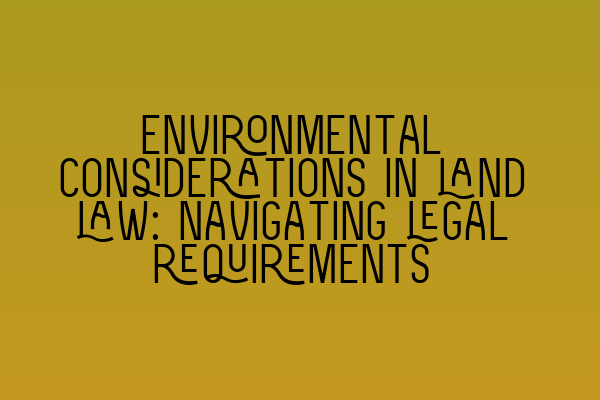Environmental considerations in land law: Navigating legal requirements
When it comes to land law, environmental considerations play a crucial role in ensuring sustainable development and the protection of our natural resources. As a solicitor specializing in property law, it is important to navigate the legal requirements surrounding environmental issues to provide comprehensive advice to clients. In this blog post, we will explore the key environmental considerations in land law and how to address them effectively.
1. Planning Permission and Environmental Impact Assessments (EIA)
Obtaining planning permission for land development projects is a critical first step. However, it is equally important to conduct Environmental Impact Assessments (EIA). An EIA evaluates the potential environmental effects of a proposed project and helps identify any necessary mitigation measures. By integrating sustainable practices and minimizing environmental impacts, developers can meet legal requirements and contribute to a greener future.
2. Protected Areas and Conservation
Protected areas, such as National Parks and Sites of Special Scientific Interest (SSSI), are designated to conserve biodiversity and maintain natural habitats. It is essential to understand the legal restrictions and implications when dealing with land situated in or near protected areas. Ensuring compliance with conservation laws is crucial to avoid fines, prosecution, or potentially having development plans rejected. Seek expert advice to navigate these often complex regulations.
3. Pollution Control and Waste Management
Proper pollution control and waste management measures are vital to protect the environment and comply with the law. Whether it’s dealing with hazardous substances, contaminated land, or implementing sustainable waste management practices, understanding the legal requirements is essential. By addressing these environmental considerations from the outset, you can ensure a smooth and environmentally responsible land development process.
4. Climate Change Adaptation and Mitigation
As our understanding of climate change continues to evolve, it is becoming increasingly important to incorporate climate change adaptation and mitigation strategies into land development projects. This may include measures such as sustainable drainage systems, green infrastructure, and renewable energy solutions. By proactively addressing climate change considerations, you can future-proof developments and reduce their carbon footprint.
5. Access and Rights of Way
Ensuring access to and from land is not only a legal requirement but also an environmental consideration. Public footpaths, bridleways, and rights of way should be accounted for when planning any development or changes to land use. Encouraging sustainable transport options and providing access to green spaces are essential for promoting a healthier and more environmentally conscious society.
Conclusion
Environmental considerations are integral to land law, providing a framework for sustainable and responsible development. By understanding and addressing these considerations, solicitors can guide clients through the complex legal requirements and help create a greener future. Whether it’s obtaining planning permission, complying with conservation laws, managing pollution, adapting to climate change, or ensuring access to land, staying informed and seeking expert advice is key.
For further information and professional support regarding environmental considerations in land law, contact SQE Property Law & Land Law at [insert contact information]. You can also check out our related articles on:
- SQE 1 Practice Exam Questions
- SQE 1 Practice Mocks FLK1 FLK2
- SQE 2 Preparation Courses
- SQE 1 Preparation Courses
- SRA SQE Exam Dates
